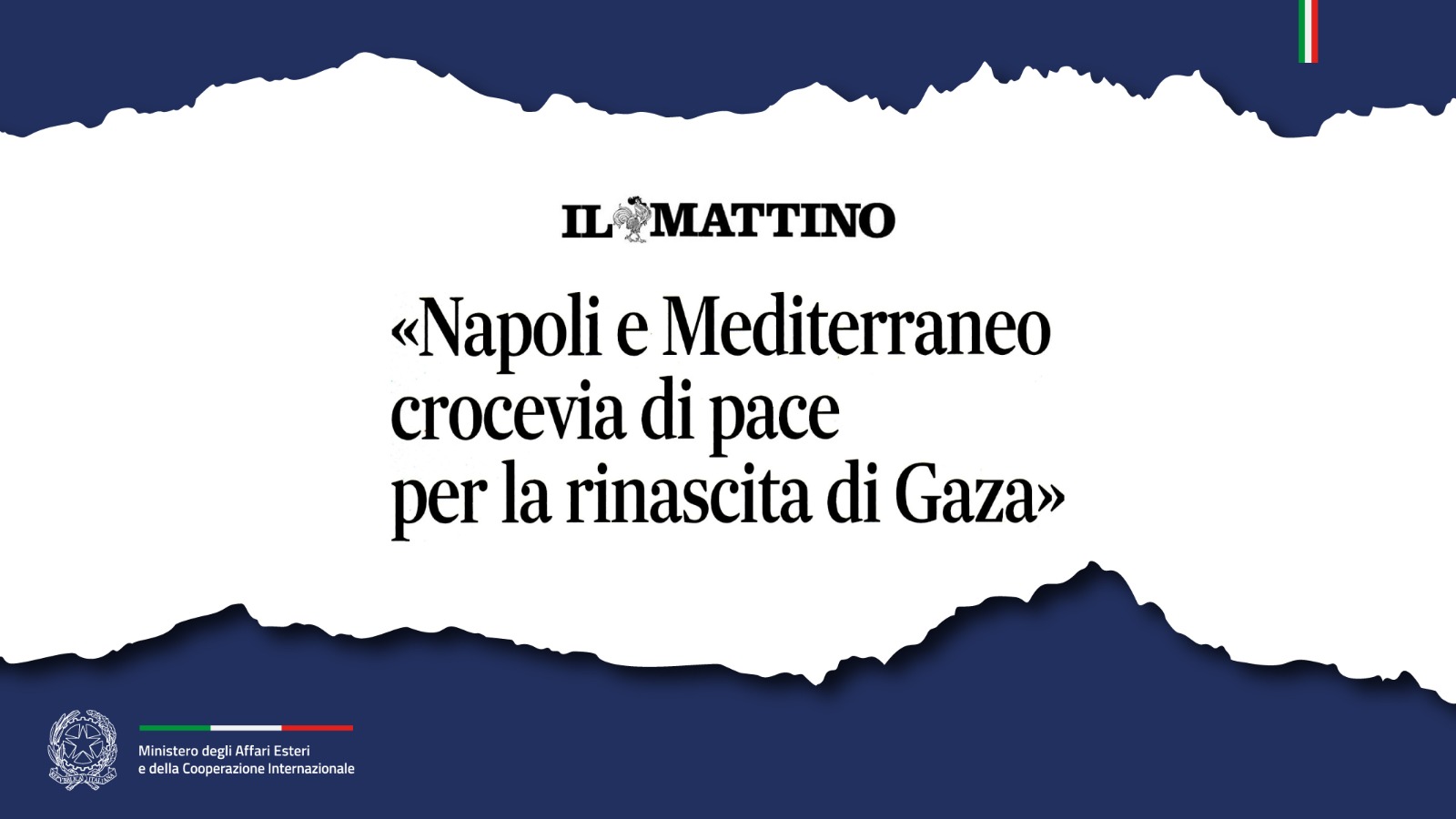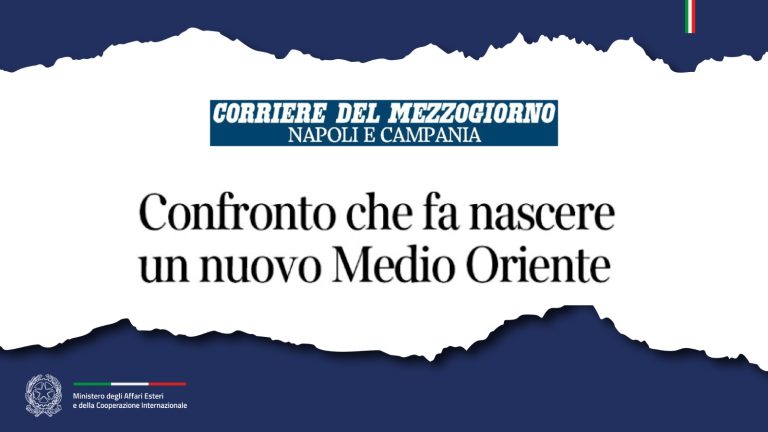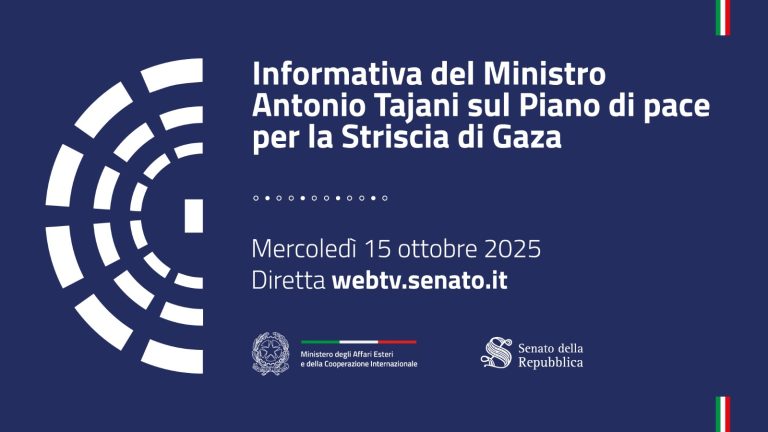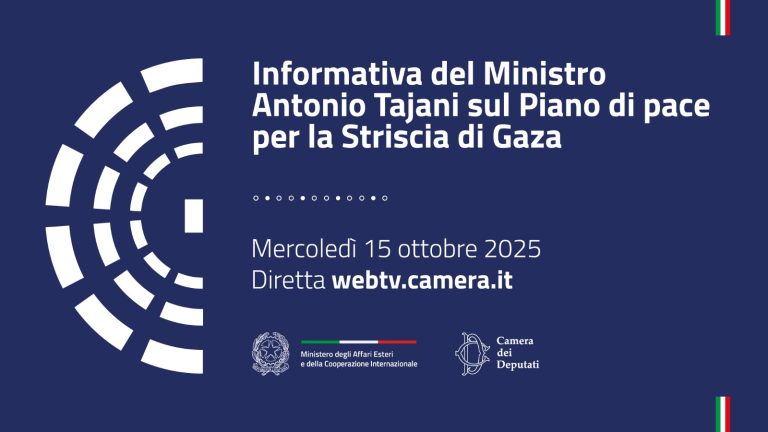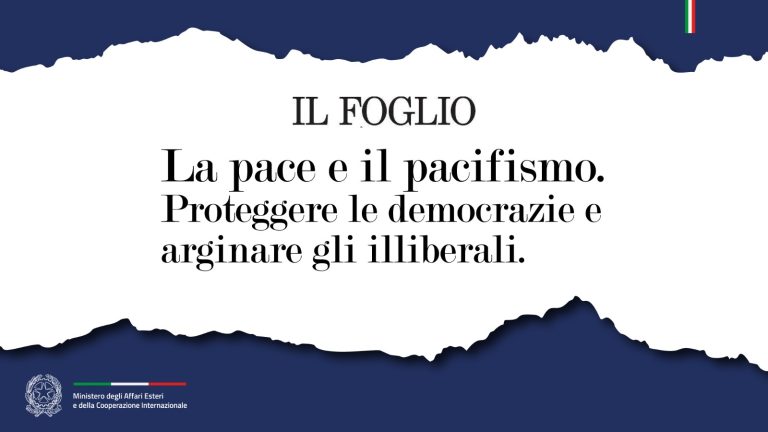Minister of Foreign Affairs Antonio Tajani, with today’s arrival in Naples of, among others, the Palestinian Foreign Minister and his Israeli counterpart Yair Lapid, can this be considered a sign of attention and confidence in Italy’s role in the Middle East peace process?
“The success of the peace initiative launched by the President of the United States could indeed represent a historic turning point, capable of reshaping the Middle East and, consequently, the Mediterranean, with profound implications for both security and national interests. The Italian Government has supported this difficult path from the very beginning. We now want to continue working to build and strengthen this ceasefire, transforming it into a more solid peace. Two very clear objectives guide us: to keep the dialogue between the parties alive and to alleviate, as far as possible, the suffering of the Palestinian civilian population. We have been able to play an active role because, over these months, we have maintained channels of dialogue with both Israel and the Palestinian National Authority (PNA). Today, Naples represents a stage in a diplomatic effort that is regaining momentum. On 7 November, Abu Mazen will be in Rome”.
For the first time in ten years, the Mediterranean Dialogues will leave Rome and be held in Naples. Why? What role does the city play in this high-level diplomatic dialogue?
“Naples is a capital of the Mediterranean. It is the place where millennia of history converge. A city celebrating its 2,500th anniversary is a location where history repeats itself. We are aware of the role that a great country like Italy is called upon to play in the world: as a crossroads of dialogue and a meeting point between cultures and civilisations. Italy must therefore act even in the places where history was made, such as Naples”.
The 20 points of the Trump Plan highlight risks and difficulties. What risks do you see in its implementation?
“We must not foster premature illusions. The path is still long, and prudence is necessary. The real risk is that the parties might find it convenient to return to military actions, or that the commitments brokered by the United States, Qatar, Türkiye, and Egypt could be disregarded. However, the path is set. I believe that no one truly wants to go backward. Italy is ready to play its part”.
How exactly will Italy contribute?
“Prime Minister Meloni’s presence last Monday in Sharm el-Sheikh for the signing of the peace agreements demonstrates that our country has played a role recognised and appreciated by all our partners, starting with the United States. Secretary of State Marco Rubio personally conveyed his appreciation for the balanced stance maintained by the Government in recent months. Recognition was also given by the foreign ministers of the Arab countries I met in Paris a few days ago, together with major European partners. To oversee all these aspects, I appointed Ambassador Bruno Archi as the new Special Envoy for the Reconstruction of Gaza, including humanitarian matters. He will be the focal point on this crucial issue and will coordinate technically with institutions, local authorities, the private sector, and civil society. Yesterday, we held a first operational meeting on Gaza at Palazzo Chigi with all ministries. We will soon launch the largest shipment of food aid ever undertaken since the start of our plan. We will start with Food for Gaza, and then address healthcare and the rehabilitation of Gaza’s infrastructure”.
One of the most controversial issues concerns Hamas’ acceptance of total disarmament. Who will guarantee democratic governance, particularly during the delicate transition phase?
“I told Parliament that the success of the Trump Plan is still hanging by a thread. Many variables remain undefined—from the return of the remains of assassinated hostages to the actual dismantling of Hamas’ military structure. In recent hours, the reopening of the Rafah Crossing between Egypt and Gaza has been announced, allowing humanitarian aid to pass. Conditions now exist for Gaza to emerge from the nightmare of Hamas, under temporary international oversight with active participation from Islamic countries. All this is aimed at achieving a true, democratic, peaceful, and non-sectarian Palestinian state, entrusted to a PNA deeply renewed in personnel and methods. The facts push us to accelerate recognition of the Palestinian State. We have always said we are ready, but the problem remains Hamas. As long as Hamas’ military organisation exists, it is difficult to move forward”.
The Trump Plan has involved Arab countries in a perspective of growth and geopolitical participation. A large delegation is expected in Naples today: what role will they play in the peace process?
“Countries such as Egypt, Qatar, and Türkiye have played a valuable mediating role. Their efforts were crucial for the positive outcome of the negotiations. The Sharm el-Sheikh Agreement marks a pivotal moment in recent Middle East history. This process represents a new phase of the Abraham Accords, aimed at normalising relations between Israel and Arab countries, in which Saudi Arabia must play a leading role. The PNA can no longer exclude itself, as it did in the past. The Middle East is politically and economically fundamental to the West—not only because of fossil fuels, but also because of projects like the Cotton Route, where the Middle East is a key hub connecting India to the Mediterranean. Gaza needs not only aid, but sustainable development capable of generating resources and well-being”.
Existing cooperation agreements between Italy and Palestine include the Mattei Plan model mentioned by Prime Minister Meloni. What other projects does Italy have underway?
“Since last year, we have allocated EUR 5 million for PNA reconstruction planning, providing UN researchers from the University of Venice. An Italian technical mission will visit Ramallah shortly to continue coordination with the PNA. At this stage, it is essential to provide immediate assistance to the population. We are therefore working to strengthen and expand Food for Gaza, involving all the best resources of the Italian System, which I brought together at the Ministry shortly after the Sharm el-Sheikh ceremony. Our agri-food sector has already made 100 tonnes of aid available, which will soon be delivered to Gaza. We have already defined an initial aid package of EUR 60 million dedicated to food security, healthcare, support for the sick, injured, and disabled, and training to foster a new Palestinian leadership. In these terrible months, we have enabled over 1,100 people from Gaza to enter Italy, including medical evacuations, family reunifications, and students. We are determined to continue our efforts to bring children requiring medical care to Italy—they have already arrived, 196 children, during the height of the conflict—and students wishing to continue their studies at our universities”.
How will the international stabilisation force operate?
“Italy is ready to play its part, drawing on its solid and recognised experience in complex international contexts. Parliament will be involved in all decisions regarding the deployment of Italian personnel, and I hope unity can be reached among all political forces. A clear international framework will be necessary, including the UN Security Council. We can rely on a unique asset: our military personnel are universally recognised as peacekeepers, and their professionalism, humanity, and diplomatic skills make them a true Italian excellence. In Lebanon, Kosovo, and Africa, they play a vital and widely respected role.
Our Carabinieri have been present in Palestine since 2013 with a bilateral training mission and participate in two major European missions. They have acquired deep local knowledge, which they can apply to serve the people of Gaza and support peace through their dedication and expertise”.

